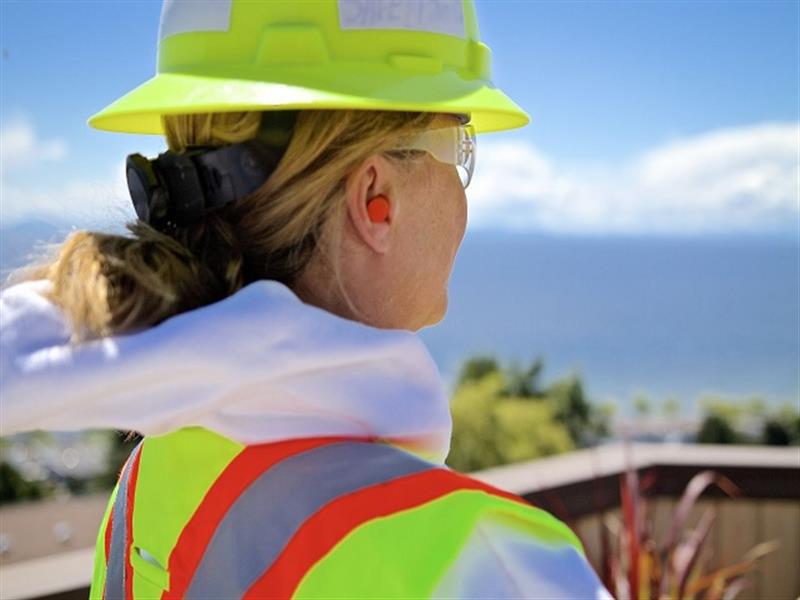
Workplace noise levels that are too loud can cause workers to lose their hearing permanently. An individual's eardrum can be harmed by loud noises produced by banging, drilling, and other mechanical activities. Hearing loss can be influenced by the kinds of noises, the level of noise, and the amount of time spent around it.
There are numerous different sizes and styles of hearing protection devices available. Managers should give employees a variety of options so they can select the right, securely-fitted tools for the job at hand.
For instance, to shield themselves from electrical risks, electricians frequently wear dielectric headphones. This gear is frequently placed over or below conventional personal protective equipment. Under their helmets, workers may need to wear bands or inserts. Other times, these gadgets could be attached to the neck or helmet.
When it's too hot to wear earmuffs or to enhance their hearing protection gear, some teams will utilise earplugs. Plugs can be unmolded, mold-made to order, or mold-made. Some of these are corded, which could be an inconvenience at work.
Developing a Program for Hearing Conservation
The following actions can be taken by managers to develop a secure and efficient hearing conservation programme at work:
1. First, managers should compile a list of all the loud noises that are heard at work, noting their respective decibel levels and frequency.
2. The management should search for solutions to lower the noise level after determining the noise's source. This can entail switching to a different piece of equipment, erecting a sound barrier, operating equipment at various times of the day, or relocating workers away from the noise source. In order to restrict their exposure to loud noise, supervisors may also swap their squads. Utilizing tools and materials carefully is another aspect of preventing loud noises.
3. Employees should refrain from dropping or banging objects that could endanger the hearing of their coworkers.
4. Managers should put up signs warning staff of high noise areas around the facility if the noise level cannot be lowered.
5. Before employees approach the noisy location, they should also give them various forms of hearing protection devices.
6. In order to ensure that this equipment will function as intended in the workplace, crew members should frequently check it for damage, such as cracks, tears, or inadequate noise control.
7. Managers should monitor and test their employees' hearing often after the baseline assessment to ensure that they are not gradually losing it.
Why does it happen?
When the victim fails to safeguard his or her ears from loud noises and other potentially damaging settings, anyone might get hearing loss. However, according to the nature of their jobs, some people may be more vulnerable to developing hearing loss than others.
For instance, those who work in manufacturing, construction, or other noisy areas are more likely to experience hearing loss than those who work in quiet offices. The following are some jobs with a very high risk of causing hearing loss:
1. Construction Personnel
2. Musicians, DJs, And Other Performers
3. Gardeners And Landscapers
4. Workers On Assembly Lines In Manufacturing
5. Agriculture
6. Forestry
7. Fishing
8. Mining And Quarrying
Lowering Your Own Personal Noise Exposure
As previously said, personal accountability must be taken into account when preserving your hearing. Even if your company takes every precaution possible, you are ultimately responsible for keeping an eye on your own health and environment. You can take the following steps to safeguard your hearing while working:
The Act Of Stopping Noisy Activities
- Wearing the specified acoustic clothing
- Reduce noise at the source by using the quietest equipment and keeping equipment in good working order.
- Reduce the amount of time you spend in noisy situations.
- Put more space between you and the noise's source.
Methods For Retaining Hearing
Earplugs: People who are near loud noises should be given earplugs and other safety equipment.
There are soundproof barriers that many factories offer to restrict and muffle sounds in particular locations. As a result, hearing loss is reduced and controlled.
Swap Shifts: To reduce the amount of noise an individual is exposed to during the day, shift rotation is a concept that is frequently utilised in factories and other noisy work places. In addition, studies show that even 15 minutes of exposure to a busy subway might eventually harm hearing. So shift rotations are quite important.
Training In Safety And Awareness: Workers should get frequent instruction. It needs to provide information on how to stop hearing loss and guidance on how to identify the warning signs and symptoms of hearing loss.
At last, even a little exposure to loud noises can have an significant impact on a person's life, decreasing their ability to hear the environment around them. Symptoms may take years to manifest. It is essential to safeguard your hearing both at work and outside of it, especially when you attend noisy events like concerts or use loud tools or equipment at home. Once noise-related hearing loss develops, it cannot be reversed.
It's ideal to keep yourself as educated with your hearing aids and a new breakthrough in the technology. Ask your query via Book an Appointment today. For more information visit https://hearing.careinc.ca or you can call us today at (403)605-6300